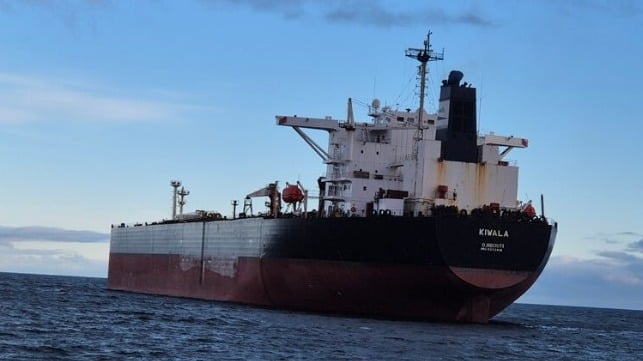Estonian Navy Detains Stateless Tanker With Dozens of Deficiencies

On Friday, the Estonian Navy boarded and detained a sanctioned tanker in the Baltic for allegedly flying a false flag. The vessel was flying the flag of Djibouti, but the Djiboutian register of shipping said that the tanker - the 18-year-old Kiwala - had already been deregistered. International databases suggest that Kiwala's Djiboutian flag service was canceled on January 1, 2025.
"During a routine inspection, there was reason to suspect the ship lacked a flag state and valid insurance. The vessel is also subject to sanctions imposed by the European Union, the United Kingdom, Canada, and Switzerland," said Cmdr. Ivo Vark, the head of the Estonian Navy.
Estonian inspectors found 40 deficiencies aboard the aging vessel, and have detained it until repairs and improvements are made. The majority of the issues are related to documentation, including its flag. It is an example of NATO member states' newly-strengthened efforts to police tanker traffic in the Baltic, outside of the 12-mile limit of territorial seas: the interdiction was initiated in international waters and the crew was asked to divert into Estonian jurisdiction.

that matters most
Get the latest maritime news delivered to your inbox daily.
Kiwala (IMO 9332810, ex name Pacific Apollo / Virgo Sun / P. Fos / Odysseus / Varuna) is a 115,000 dwt crude tanker built in 2007. Like many "shadow fleet vessels," she has flag-hopped extensively: previous flags in the last three years include St. Kitts, Mongolia and Gabon. She is currently managed by a Chinese company, crewed by Chinese officers, and owned by an anonymous firm in Mauritius. Her ultimate beneficial owner is not known, but she was once part of the well-known Gatik Ship Management fleet.
Kiwala and gray-market vessels like her may face a new source of competition. Western tanker owners and insurers can now legitimately do business in the Russian oil market, thanks to the falling cost of crude. Due to steep U.S. tariffs on trading partners and investor concerns about the state of the global economy, oil prices have slid, and the Russian Urals grade has begun fetching less than $60 per barrel - the price cap set by the G7 in 2022 for Western shipping services.
